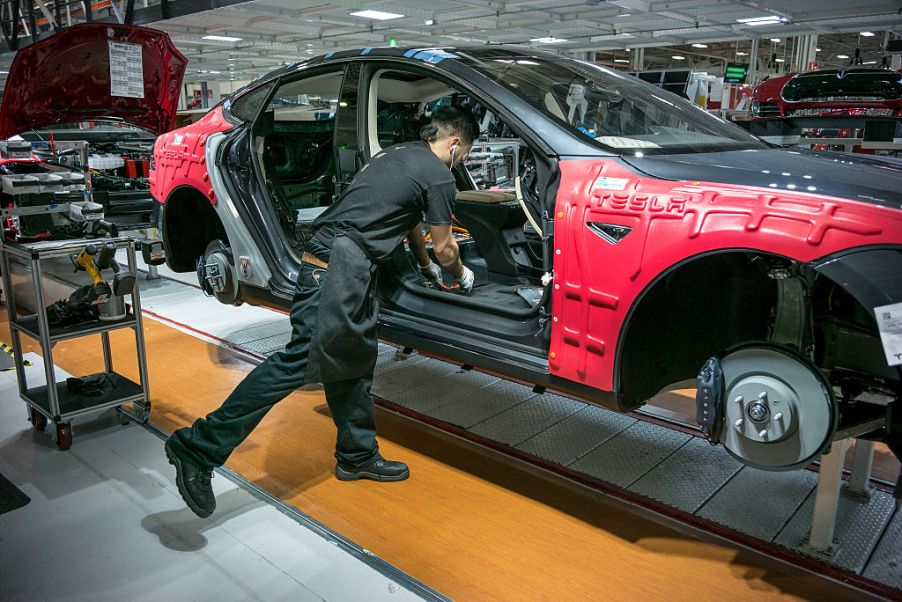
Coronavirus Has Even Affected Tesla Production
The far-reaching nature of the Coronavirus (COVID-19) pandemic has drastically changed the way the world does business. The automotive industry plays a key role in global business and has had to make rapid adjustments to keep up with the changes.
Automakers have been forced to modify processes throughout their supply chains. Tesla, one of the largest electric vehicle makers in the world has had to make a surprising supply-chain compromise. Car and Driver’s Roberto Baldwin provides details about how Tesla is handling it.
Older hardware in new cars
Imagine having a shiny new Tesla Model 3 delivered and finding out that it isn’t equipped with the latest version of its driver-assistance system. This snafu is what some Chinese customers experienced recently. Their Model 3s were shipped with Tesla’s Autopilot hardware processor version 2.5.
Ever since April 2019, current Model 3s have Autopilot version 3.0 installed. In an earlier presentation, Tesla’s CEO Elon Musk claimed that version 3.0 can process images 21 times faster than the previous version. Musk also has promised that this version also would give owners the chance to get a full self-driving upgrade if and when Tesla makes it available.
The Chinese customers were upset and confused. They believed that Tesla was trying to sneak a downgrade into their new cars. But what caused this glitch? According to Tesla, the older version was installed due to supply-chain problems with the latest 3.0 version processor.
Tesla’s supply chain isn’t the only one disrupted by the Coronavirus
To its credit, Tesla didn’t use the Coronavirus outbreak as an excuse for installing older hardware in new cars. But CNBC reports that the automaker warned that the pandemic could negatively affect its performance as it prepares to file its annual report for the U.S. Securities and Exchange Commission.
And it points up how automakers are struggling to keep up production as a consequence of the Coronavirus outbreak. For example, Toyota has temporarily closed its plants in China for almost two months.
Fiat-Chrysler has paused production at its Italian plants. At its Indiana factory, a worker has tested positive for COVID-19.
BMW, Ford, Honda, Hyundai, Nissan, PSA Peugeot Citroen, and Suzuki are among the other carmakers that have all had to alter their regular production schedules in China and South Korea.
Events key to the automotive industry such as the Geneva Auto Show and the New York International Auto Show have been canceled or postponed. On a smaller scale, COVID-19 will scrub many local car shows such as this year’s Portland Roadster Show off the schedule.
Motorsport events have also felt the effects of the outbreak. NASCAR, IndyCar, and other car races have either been shelved or go on as scheduled but with no fans in the raceways. And the Coronavirus has thrown a monkey wrench into the production schedule of car-related TV shows, such as the fourth season of The Grand Tour, which features the former hosts of BBC’s Top Gear.
So the ongoing fallout from the Coronavirus is not just related to problems with vehicle production and overseas outsourcing. It also affects the lives and livelihood of those who work in all aspects of the automotive industry.
The electric vehicle manufacturer’s bewildering solution
Let’s return to the saga of Tesla and the older processor that annoyed the Chinese owners of new Model 3s. The EV maker’s supply chain problems prompted the questionable decision to install the earlier version hardware in those Model 3s made in China.
The automaker apologized to its irate customers. It also tried to appease them by pledging to install Autopilot version 3.0 for free as soon as it became available.
It’s hard to understand why Tesla would make such an odd business decision that would anger some of its customers. Having them return to the service centers to have the process updated seems like it would be a hassle. It also will create extra work for already busy service technicians.
It might have been smarter for Tesla to communicate directly with those customers before delivering the cars. They could have told them that the new processor wasn’t available yet and manage the consequences. At least it would have looked as if Tesla was trying to pull a fast one.
But it seems that Tesla management seems to believe that it’s better to ask forgiveness than to seek permission. It’s not a good business model but it’s worked for Tesla in the past when confronted with production, legal, and financial challenges. Whether this approach will continue to work for Tesla during the Coronavirus crisis remains to be seen.


